- Home
- Kate Quinn
The Rose Code Page 3
The Rose Code Read online
Page 3
“I’m no Greek . . .” He spun her, and Osla was too out of breath to continue until the music relaxed to a dreamy waltz. Philip slowed, raking his disordered hair back into place before gathering Osla up with one arm about her waist. Osla put her hand in his, and they fell easily in rhythm.
“What do you mean, you’re no Greek?” she asked as couples bumped and laughed all around them. The Café de Paris had a warm intimacy that no other nightclub in London could match, maybe because it was twenty feet belowground. Music always seemed louder here, champagne colder, blood warmer, whispers more immediate.
Philip shrugged. “I was carried out of Corfu in a fruit box when I wasn’t even a year old, steps ahead of a horde of revolutionaries. I’ve not spent much time there, don’t speak much of the language, and won’t have any cause to.”
He meant he wouldn’t be king, Osla knew. She had some vague knowledge that the Greek royals had regained their throne, but Philip was far down the line of succession, and with his English grandfather and English uncle, he looked and sounded like any royal cousin. “You sound more English than I do.”
“You’re Canadian—”
“—and none of the girls I came to court with would ever let me forget it. But until I was ten, I had a German accent.”
“Are you a Hun spy?” He raised an eyebrow. “I don’t know any military secrets worth seducing me for, but I hope that doesn’t put you off.”
“You’re very ill behaved for a prince. A positive menace.”
“All the best ones are. Why the German accent?”
“My mother divorced my father and came to England when I was small.” Osla revolved under his hand in a spin, came back into the curve of his arm again. “She stuck me in the country with a German governess, where I spoke only German Mondays-Wednesdays-Fridays, and only French Tuesdays-Thursdays-Saturdays. Until I went to boarding school, I only spoke English one day a week, and everything with a German accent.”
“A Canadian who sounds like a German and lives in England.” Philip switched to German himself. “Which country really has a claim on the heart of Osla Kendall?”
“England für immer, mein Prinz,” Osla replied, and switched back before they really could be accused of being Hun spies in this room full of tipsy, patriotic Londoners. “Your German’s perfect. Did you speak it at home?”
He laughed, but the laugh had a sharp edge. “What do you mean, ‘home’? Right now I’m on a camp bed in Uncle Dickie’s dining room. Home is where there’s an invitation or a cousin.”
“I know something about that.”
He looked skeptical.
“Right now I share digs with Sally. Before that, there were some dreadful cousins in Montreal who didn’t want me. Before that, my godfather let me stay with him while I did the Season.” Osla shrugged. “My mother has a permanent suite in Claridge’s, where I’m de trop if I stay longer than a night, and my father died years ago. I couldn’t tell you where home is.” She smiled, very bright. “I’m certainly not going to get in a flap about it! All my friends who still live at home are dying to get away, so who’s the lucky one?”
“Right now?” Philip’s hand curled against her waist. “Me.”
They waltzed in silence for a while, bodies moving in perfect ease. The dance floor was sticky with spilled champagne; the band dragged. It was near four in the morning, but the floor was still packed. No one wanted to stop, and that included Osla. She looked over Philip’s shoulder and saw a poster pinned to the wall, one of the ubiquitous victory posters that had sprouted like mushrooms all over London: WE BEAT ’EM BEFORE, WE’LL BEAT ’EM AGAIN!
“I wish the war would get going,” Osla said. “This waiting . . . we know they’re going to come at us. Part of me wishes they’d just do it. The sooner it’s begun, the sooner it’s over.”
“I suppose,” he said shortly, and moved so his cheek was at her hair and they weren’t eye to eye anymore. Osla could have kicked herself. All well and good to say you wished the war would kick off when you, being one of the gentler sex, wouldn’t be the one fighting it. Osla believed everyone should fight for king and country, but she was also aware that this was a very theoretical position when you were female.
“I do want to fight,” Philip said into Osla’s hair as though reading her mind. “Go to sea, do my bit. Mainly so people will stop wondering if I’m secretly a Hun.”
“What?”
“Three of my sisters married Nazis. Not that they were Nazis when they first . . . Well. I’d like to shut up the fellows who think I’m slightly suspect because of the family sympathies.”
“I’d like to shut up the ones who think a dizzy debutante can’t possibly do anything useful. Do you go to sea soon?”
“I don’t know. If I had my way, I’d be on a battleship tomorrow. Uncle Dickie’s seeing what he can do. It could be next week, it could be a year.”
Make it a year, Osla thought, feeling his shoulder firm and angular under her hand. “So, you’ll be at sea hunting U-boats, and I’ll be banging rivets in Slough—not too shabby for a silly socialite and a slightly suspect prince.”
“You could do more than bang rivets.” He gathered her closer, not taking his cheek from her hair. “Have you asked Uncle Dickie if there’s anything at the War Office for a girl with your language skills?”
“I’d rather build Hurricanes, get my hands dirty. Do something more important for the fight than bang typewriter keys.”
“The fight—is that why you finagled your way back from Montreal?”
“If your country is in danger and you’re of age to stand and defend it, you do so,” Osla stated. “You don’t cash in on your Canadian passport—”
“Or your Greek passport—”
“—and bunk out for a safer port of call. It’s just not on.”
“Couldn’t agree more.”
The waltz ended. Osla stepped back, looked up at the prince. “I should get back to my digs,” she said regretfully. “I’m knackered.”
Philip motored Osla and the yawning Sally back to Old Windsor, driving as ferociously as he danced. He helped Sally out of the backseat; she gave his cheek a sleepy peck and negotiated her way across the dark street. Osla heard a splash and a yelp, then Sally’s voice called back sourly: “Mind your shoes, Os, there’s a lake in front of our door . . .”
“Better put my boots back on,” Osla laughed, reaching for her diamanté buckles, but Philip swung her up into his arms.
“Can’t risk the glass slippers, princess.”
“Oh, really, now,” Osla hooted, settling her arms about his neck. “How slick can you get, sailor?”
She could almost feel his grin as he carried her through the dark. Osla’s boots and evening bag dangled against his back, hanging from her elbow, and he smelled of aftershave and champagne. Philip’s hair was mussed and sweat-damp from dancing, curling softly against her fingers where her hands linked at the back of his neck. He splashed through the puddle, and before he could set Osla down on the step, she brushed her lips against his.
“Gets it out of the way,” she said, flippant. “So there’s none of that terribly awkward will-we-won’t-we on the step.”
“I’ve never had a girl kiss me just to get it out of the way.” His mouth smiled against hers. “At least do it properly . . .”
He kissed her again, long and leisurely, still holding her off the step. He tasted like a blue, sun-warmed sea, and at some point Osla dropped her boots into the puddle.
At last he set her down, and they stood a moment in the darkness, Osla getting her breath back.
“I don’t know when I’ll go to sea,” he said at last. “Before I do, I’d like to see you again.”
“Nothing much to do around here. When we aren’t banging Dural, Sal and I eat porridge and muck about with gramophone records. Very dull.”
“I don’t imagine you’re as dull as that. In fact, I’ll wager the opposite. I’ll lay odds you’re hard to get over, Osla Kendall.”
“Come see me any night, Philip,” Osla said simply, playing no games at all, and felt her heart thumping as he touched his fingers to his hat and walked back to the Vauxhall. It was the dawn of 1940, and she had danced in the New Year in a boiler suit and satin sandals with a prince. She wondered what else the year would bring.
Chapter 3
June 1940
Mab was doing her best to disappear into her library copy of Vanity Fair, but even Becky Sharp flinging a dictionary out a coach window couldn’t hold her attention when the train leaving London was so crowded, and when the man in the seat opposite was fondling himself through his trouser pocket.
“What’s your name?” he’d crooned when Mab dragged her brown cardboard suitcase aboard, and she’d shot him her iciest glare. He’d been forced off to one side when the compartment filled up with men in uniform, most of them trailing hopefully after a stunning brunette in a fur-trimmed coat. But as the train chugged north out of London, the compartment emptied of soldiers stop by stop, and when it was just Mab and the brunette, the fondler began crooning again. “Give us a smile, luv!” Mab ignored him. There was a newspaper on the compartment floor, tracked with muddy boot prints, and she was trying to ignore that too—the headline screamed Dunkirk and disaster.
“We’re next,” Mab’s mother had said as Denmark fell, Norway fell, Belgium fell, Holland fell, one after another like boulders rolling inexorably off a cliff. Then ruddy France fell, and Mrs. Churt gave even bleaker shakes of the head. “We’re next,” she said to everyone who would listen, and Mab nearly bit her head off. Mum, would you mind not talking about murdering, raping Huns and what they’re going to do to us? It had been a terrible row, the first of many once Mab had tried to persuade Mum to leave London with Lucy. Just for a while, she said, and Mum retorted, I leave Shoreditch feetfirst, in a box.
And that row had been so bad, it was just as well that Mab had received this odd summons a week ago about a post in Buckinghamshire. Lucy didn’t really understand she was going away; when Mab had hugged her tight that morning before departing, she’d just put her head on one side and said “’Night!” which meant See you tonight!
I won’t be seeing you tonight, Luce. Mab had never been away from Lucy overnight, not once.
Well, Mab would take the train back to London the first day she had off. Whatever this post was, there had to be days off, even in wartime. And maybe her living situation in—what was this town called again?—would be decent enough she could see about moving her family here to the country. Better the middle of nowhere among green fields than soon-to-be-bombed London . . . Mab shuddered and went back to Vanity Fair, where Becky Sharp was headed for a new job in the country too, not appearing to worry much about her homeland’s being invaded. But in Becky’s day it had been Napoléon, and Napoléon didn’t have bloody Messerschmitts, did he?
“What’s your name, lovely?” The fondler had switched his attentions to the little brunette in the fur-trimmed coat, who was now the only other passenger in the compartment. His hand began to work away in his pocket. “Just one smile, gorgeous—”
The brunette looked up from her own book, flushing pink, and Mab wondered if she’d have to intervene. Normally she abided by a Londoner’s strict rule of keep your nose out of other folks’ business, but the brunette looked like an absolute lamb in the woods. Just the sort of female Mab both slightly resented and also envied—expensively dressed, pampered skin that a gushy novel would describe as alabaster, the sort of pocket-sized figure all women wanted and all men wanted to take a bite out of. The kind of silly overbred debutante, in short, who had grown up riding ponies and wouldn’t have to lift a finger to bag herself a husband of means and education, but was otherwise completely useless. Any Shoreditch girl could handle a train compartment lothario, but this little bit of crumpet was going to get munched right up.
Mab laid down Vanity Fair with a thump, irritated with the fondler and rather irritated with the brunette too for needing rescuing. But before she could even snap Look here, you . . . the brunette spoke up.
“My goodness, look at the tent in your trousers. I can’t say I’ve ever seen anything quite so obvious. Most fellows do something incredibly creative with their hats at this stage.”
The man’s hand froze. The brunette put her head to one side, eyes widening innocently. “Is something wrong? You aren’t in pain, are you? Chaps always act like they’re in such pain at this point, I’m nobbled if I know why . . .”
The fondler, Mab observed, was red as a beet and had withdrawn his hand from his pocket.
“. . . Really, do you need a doctor? You’re looking absolutely in the basket—”
The man fled the compartment with a mutter. “Feel better soon!” the little brunette called after him, then looked over at Mab, eyes sparkling. “That fixed him.” She flung one silk-stockinged leg over the other with evident satisfaction.
“Nice work,” Mab couldn’t help but say. Not such an easily munched bit of crumpet after all, even if the girl didn’t look a day over eighteen. “If I have to get rid of a fellow like that, I rely on a good icy stare or a kick in the shins.”
“I can’t do an icy stare to save my life. This face simply won’t glower. If I try, fellows tell me I look adorable, and there’s nothing to make you flip your wicket like being told you’re adorable when you’re furious. Now, you’re clearly tall, and you’ve got eyebrows like an empress, so I’m sure you have a very impressive glare?” Tilting her head in invitation.
Mab had been about to retreat into her book, but she couldn’t resist. Arching one brow, she looked down her nose and let her lip curl.
“Now that’s a slap-up stare to freeze the marrow!” The brunette put out a hand. “Osla Kendall.”
Mab shook it, surprised to feel calluses. “Mab Churt.”
“Mab, that’s topping,” Osla approved. “I was going to guess Boadicea or Scarlett O’Hara; someone who could drive a chariot with knives or shoot Yankees on staircases. I got stuck with Osla because my mother went to Oslo and said it was too too utterly divine. What she meant was that I was conceived there. So now I’m named after a city that is being crawled over by Germans, and I’m trying not to take it as a prediction.”
“Could be worse. What if you’d been conceived in Birmingham?” Mab was still trying to make sense of the girl’s work-roughened hands in contrast to her Mayfair drawl. “Surely those calluses didn’t come from finishing school.”
“From building Hurricanes at the Hawker Siddeley factory in Colnbrook.” Osla saluted. “Who knows what I’ll be doing now. I was called to interview in London, and then the strangest summons arrived telling me to go to Bletchley station—”
“But that’s where I’m going.” Startled, Mab dug out the letter in her handbag, much puzzled over when it had arrived in Shoreditch. Turning, she saw an identical letter in Osla’s hand. They held the sheets side by side. Osla’s letter read:
Please report to Station X at Bletchley station, Buckinghamshire, in seven days’ time.
Your postal address is Box 111, c/o the Foreign Office. That is all you need to know.
Commander Denniston
Mab’s was more official—I am desired by the Chief Clerk to inform you that you have been selected for the appointment of Temporary Clerk . . . you should attend for duty in four days’ time, traveling by the 10:40 a.m. train from London (Euston) to the third stop (Bletchley)—but the destination was clearly the same.
�
�Curiouser and curiouser.” Osla looked thoughtful. “Well, I’m dished—never so much as heard of Bletchley or Station X.”
“Me either,” said Mab, and wished she’d said “Nor I.” Osla’s polished voice and breezy slang were making her self-conscious. “I had an interview in London, too—they asked me about my typing and shorthand. They must’ve got my name from the secretarial course I took last year.”
“They didn’t ask me about typing at all. This hatchet of a woman tested my German and my French, then told me to run along home. About two weeks later, this.” Osla tapped the letter. “What can they want us for?”
Mab shrugged. “I’ll put my hours in for the war doing whatever they want. What matters to me is earning a wage to send home, and being close enough to London to visit every day off.”
“Don’t be so prosy! We could be walking right into our own Agatha Christie novel here, The Mystery of Station X . . .”
Mab adored Agatha Christie. “Murder at Station X: A Hercule Poirot Mystery . . .”
“I prefer Miss Marple,” Osla said decidedly. “She’s exactly like every spinster governess I ever had. Just with arsenic instead of chalk.”
“I like Poirot.” Mab crossed her legs, aware that her shoes, no matter how carefully she’d shined them, looked cheap next to Osla’s hand-stitched pumps. At least my legs are just as good as hers, Mab couldn’t help thinking. Better. That felt rather petty and mean-spirited, but Osla Kendall was so clearly a girl who had everything . . . “Hercule Poirot would give a girl like me a fair hearing,” she went on. “The Miss Marples of the world take one look and decide I’m a tart.”
When the train drew to the third stop at last, Osla whooped “Tallyho!” but Mab’s hopes soon waned.
Half a mile of suitcase dragging from the dreary, crowded station led them to an eight-foot chained fence topped by rolls of barbed wire. The gates were manned by two bored-looking guardsmen. “Can’t come in here,” one said as Mab rummaged for her papers. “Got no pass.”

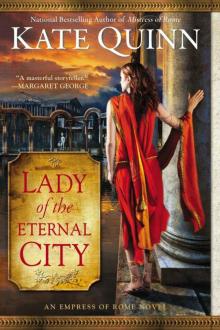 Lady of the Eternal City
Lady of the Eternal City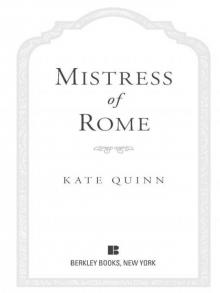 Mistress of Rome
Mistress of Rome Daughters of Rome
Daughters of Rome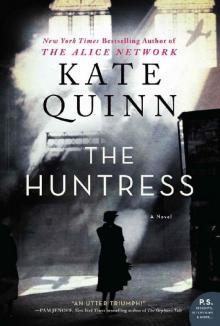 The Huntress
The Huntress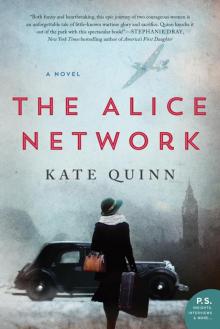 The Alice Network
The Alice Network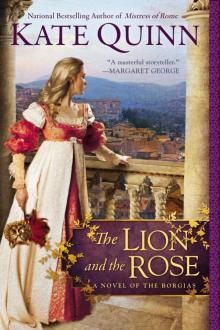 The Lion and the Rose
The Lion and the Rose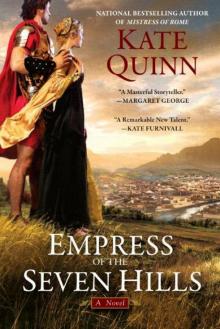 Empress of the Seven Hills
Empress of the Seven Hills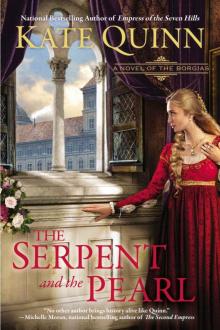 The Serpent and the Pearl
The Serpent and the Pearl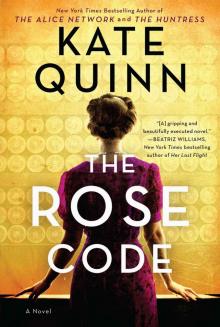 The Rose Code
The Rose Code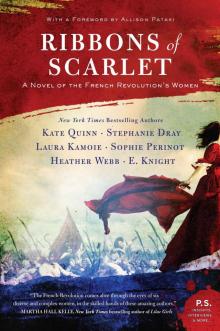 Ribbons of Scarlet
Ribbons of Scarlet A Song of War: a novel of Troy
A Song of War: a novel of Troy